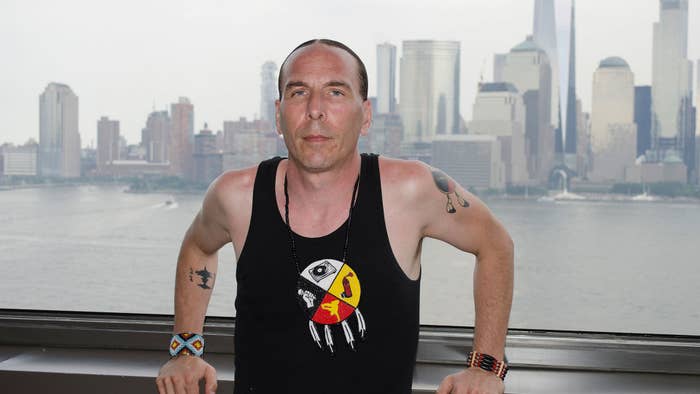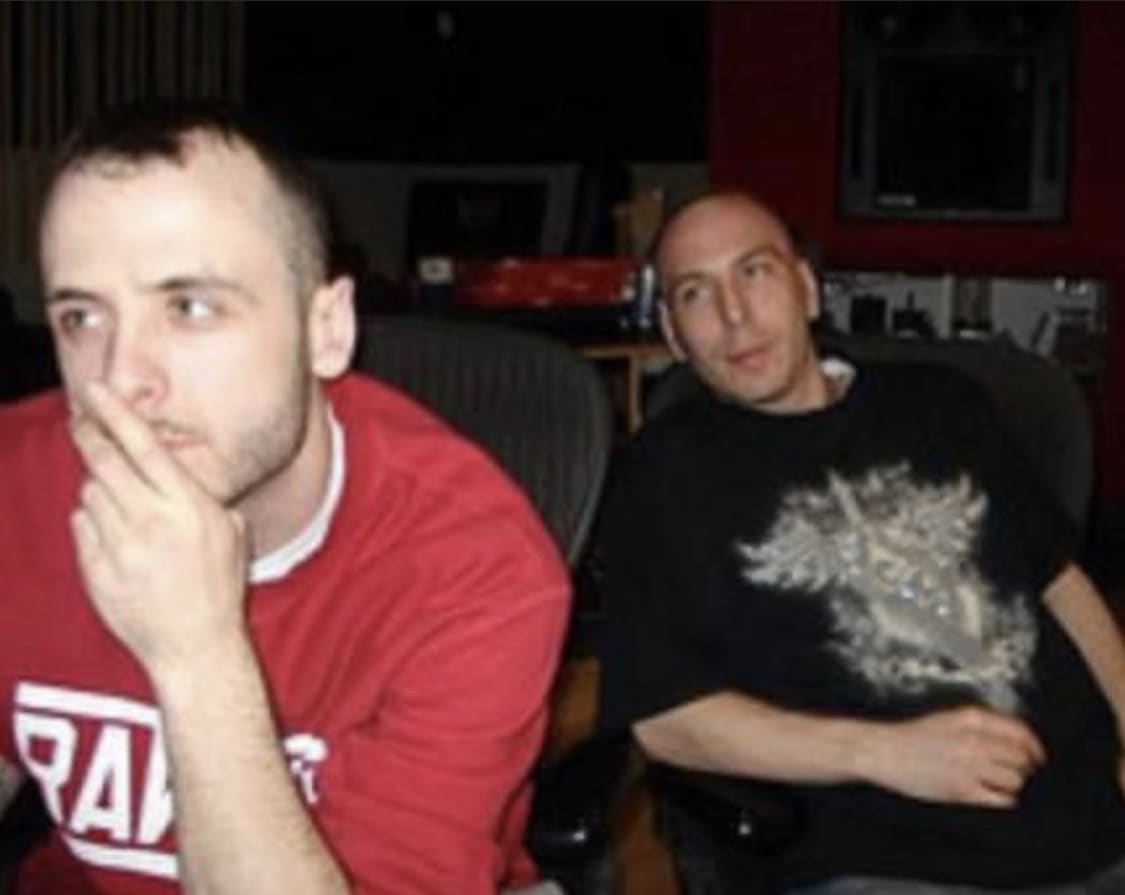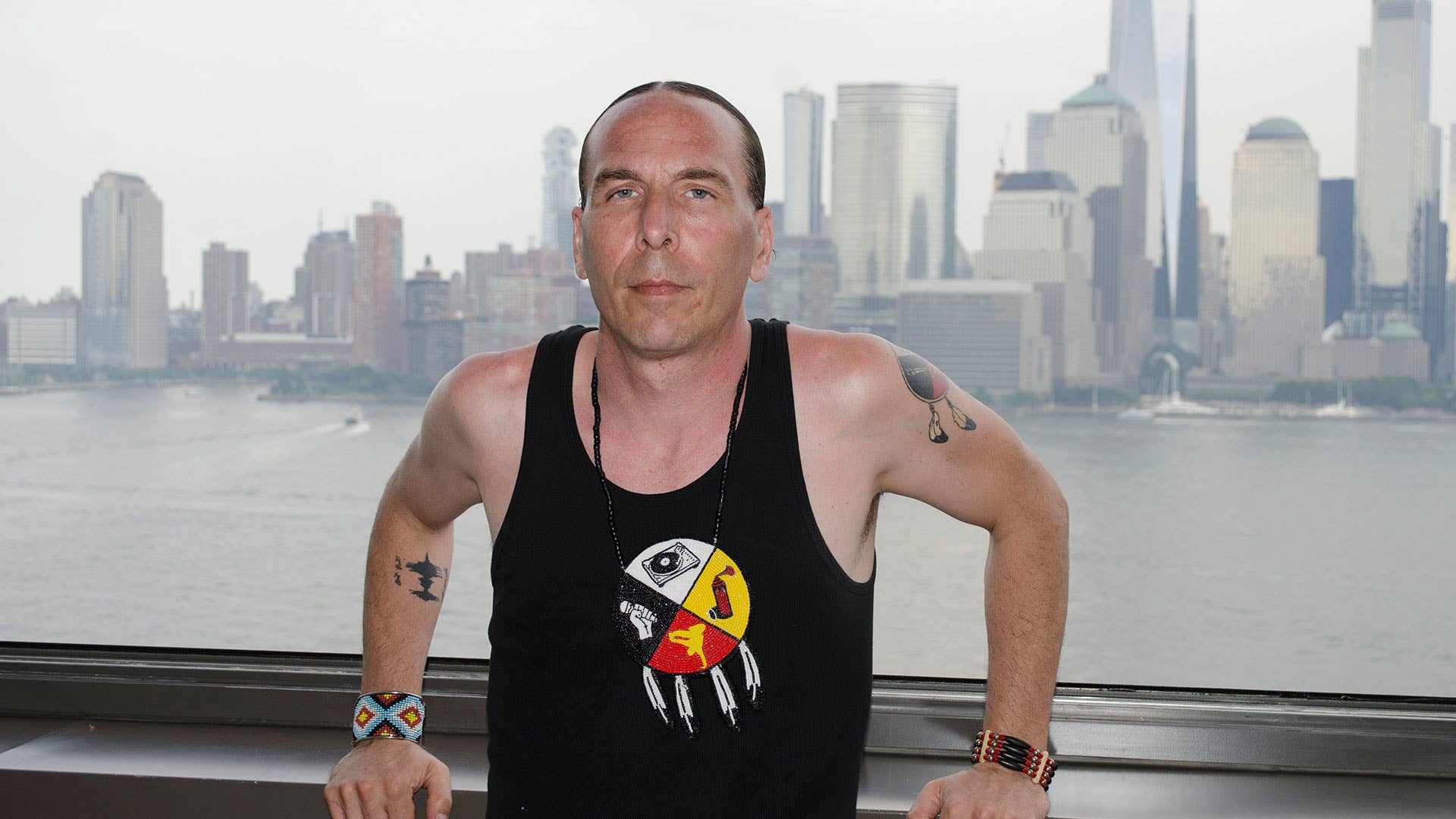
Toronto’s David “Gordo” Strickland worked on Drake’s debut studio album Thank Me Later a decade ago, but Aubrey Graham was still a kid when the destined producer, engineer, and mixer got his start in Toronto’s burgeoning hip-hop scene as a b-boy, then DJ—then behind the boards.
He went on to man sessions with the T-dot artists who paved the way for Drizzy—Saukrates, Chocolair, Ghetto Concept, Jelleestone, Kardinal Offishall, and more. His success in Canada also brought opportunities stateside, with the likes of Pete Rock, Erick Sermon, EPMD, Keith Murray, Redman, and Method Man.
In more recent years, Strickland has been on an inward journey, investigating and exploring the Indigenous side of his family’s lineage—Mi’kmaq, Innu, and Beothuk lines with strong Cree and French roots that he traced back to colonist Samuel De Champlain. As he learned more about his background, he started expressing himself through visual arts, combining Indigenous tradition with hip-hop elements. His drawings and paintings have been featured in galleries across the country, including the famed McMichael Canadian Art Collection.
Naturally, he got the idea to do an Indigenous-centred hip-hop album—the first of his career, entitled Spirit of Hip Hop—rounding up some three-dozen guests. Since relating more deeply to his heritage, he echoes the perspective of Native American hip-hop photographer Ernie Paniccioli that the genre didn’t start in 1973 at 1520 Sedgwick, rather the four elements have their roots in Native culture: “The DJ is the drummer; the MC is the storyteller, the b-boy is the dancer, and the graffiti artist is the sand painter.” Those words, by Paniccioli, kick off the 16-track collection, which ranges from “Questions Last” about Winnipeg, Canada’s “murder capital”; “Helpless” about fighting the demons of addiction that can lead to suicide, and “Turtle Island”—the First Peoples’ name for the land mass settlers call “North America.”
Complex talked to Strickland about his start in music, the importance of knowing your history, his hope for the album, and his views on the Black Lives Matter protests.
It’s the 10th anniversary of Thank Me Later. How did you meet Drake?
I first met Drake in Atlanta at the concert. I was down there with Erick Sermon and 40 was in town. That was just after that mixtape [So Far Gone]. Before the deal is when I met him. By the time the record comes out, back in Canada, things weren’t like they are now, but that's my boy, that's my friend. He's like a brother. It’s a small little circle that we have. Most of us knew each other. And a lot came up under people that myself and Gadget (producer Noel Campbell) taught or gave opportunities. Not everybody stays in the circle. A lot of people do other things, but him and I became really good friends, so it was natural for him to hit me up.

What was your contribution to that album?
I engineered on there. Me and [producer] Gadget [Noel Campbell] mixed a bunch of songs. I had to stand down as far as hierarchy; he's the boss. I'm the assistant, but you have two vets in there. We had a great time. I'm very thankful to Drake and 40 for that experience. Anything that I did work on, I had some great memories. It was a moment that brought the whole thing full circle for me, as far as starting back in the early days of Rumble and just working on all the records with Sauks and Kardi and Choclair and Jully [Black]. There were a lot of firsts back then. Artists signing to American labels. So by the time he got to Thank Me Later, even though I was kinda gone, running around for a bit, that brought the whole journey for me and Gadget full circle that now we finally did it. We were trying to get artists to pop in America and worldwide like that, and then those guys took it to an incredible other level.
Did you try and get Drake on Spirit of Hip Hop?
I mentioned stuff to him here and there, but I was always kinda joking. I'm doing remixes of the songs, having other producers I work with, so there might be a surprise here or there. I had a wish list, but sometimes, if you're in the moment, it's going to happen, but I didn't want to pressure him. He’s busy.

Still, without Drake, there’s a lot of names that I recognize on your album—Maestro, Saukrates, Whitey Don, JRDN, the late King Reign, Snotty Nose Rez Kids—but a lot of Indigenous artists that I haven't been exposed to. How are you connecting with them in Canada?
The way it happened was kind of magical. I was up in a very remote area. I had an idea about doing this kind of record back then and I was up there with my cousin teaching. He was a b-boy. And while we were up there, he said, "There’s these two guys, they rap, they’re brothers.” They’re called Violent Ground. We went and checked them out and I did a song with them that night. That’s what started it.
Is the song on the album?
I did an album with them at the time and a song with them called “Rez Life.” So when I was doing this project before “Helpless” [featuring Violent Ground and Chippewa Travelers], I was like, “They gotta be on the album. I'm going to bring "Rez Life" back, but make it like a "Northern Touch." That's how I got everybody on it [Violent Ground, Que Rock, Drezus, Joey Stylez, and Hellnback). A lot of people didn't hear the original version, so I changed it up a bit, made it a new song. I was trying to be inclusive, as far as getting more MCs on one track. And they were here at the end, and the last song I recorded was “Helpless.” I'm actually singing on that song in the chorus with them.
So back to the story: I met them in the middle of nowhere. And after that I had to do my research, who are the artists in the communities, who’s the biggest rapper, who's the biggest singer. I started checking things out and slowly over time meeting people. They just started bringing them to me. People would just turn up and I started connecting with people. Sometimes I have to go places, but most people were in town. I just got so much love. It wasn’t like people heard I was doing this record; I was just trying to do work with people in general, as far as Indigenous artists go.
With your reputation and this album, you could really make an impact helping these young artists. Maybe not even young, but just helping Indigenous artists meet people in the music industry.
Well, that's the concept of the album. The album is not about me. Yeah, it’s a producers’ album, but it's not about me. I got a verse on there, but it's about these artists. And I don't want to say "help.” I'm just trying to expose them. Most people don’t know the amount of incredible talent we have in Indigenous communities because we’re not exposed to it and a lot of times we get put in the Indigenous category. There's no reason we shouldn't be being played on mainstream stations or any station. I know we have stations for everybody and that's not what I'm saying, but it happens in other cultures too. I don't want to give examples, but as far as Indigenous goes, yeah, most people aren't exposed to it. So the idea [of the album] was to expose, and put the two together because there's some talent. There's no reason these artists shouldn't be on the same playing field.
Lyrically, what do you want us to learn? The takeaway? There's some pretty heavy subjects on here.
I tried not to make it all so serious. There is some educational; it's not all serious. The takeaway, I’ll try to sum it up in a few words: it's a situation where, look, it's not going to go away; we're always going to be here. If there's a problem, whether it’s in America where they have racial problems, or in Canada, we have problems with Indigenous people and land, we’ve got to resolve these issues in a positive way. We can't just keep having these situations, where it sparks something and then nothing's done about it. It should be an ongoing process. Where are the leaders, you know what I’m saying?
I just want people to open their heart and their minds and take it in and think about it in a positive way. I'm not trying to complain. I'm just trying to say, “Look, this is where we're at. What are we going to do about it? Do something.” When I say “we,” I mean everybody, and not only just the problems we have; there are other problems in the country that are not Indigenous problems. I'm just trying to shed some light on the community. And now, I don't know what's going to happen going further, but people need to understand that that means all races and everybody coming together. And once we do that, there'll be a shift in consciousness.
For me, the album is a history lesson and culture lesson. When you were working with all the Canadian legends—Sauk, Jully, Choclair—back in the day, did you talk about your Indigenous heritage?
Sometimes things would come up. Most of those guys, the whole circle, Jully and all them, they all went to Fresh Arts. Me and Sauks were pretty close, but he told me later that in Fresh Arts, they all had to take a course on Indigenous culture. So they knew stuff that we didn't get to talk about. I was young and things were moving fast. When I first met those guys, I was probably about 19. I had five kids by the time I was 21. I was still in the fire, working hard, and I wasn't really paying attention as much as I do now.
Did your family talk about Indigenous heritage?
My uncle’s side, they're French Canadian and then on my grandpa's side there's Cree, but we didn't know shit about it. All I knew was French, but on my dad's side is mostly Indigenous, but it was something you didn't talk about. It was a survival tactic, but then it became more of a shameful thing. So by the time you got to me, little things were mentioned, but then you move on. It’s like what they told me when I got my name, all my ancestors have always been there with me. So maybe they [his family] didn't know; maybe they don't have the answers to give you if they weren't raised a certain way.
So here's me, I was a hockey kid, but I really took to hip-hop really young. I was DJing. By the time I started making records, the culture was dominated by African-Americans, African-Canadians. If you went to the Concert Hall, if you went to Spectrum, if you were at the clubs back in the day, there weren’t many white people. And all my friends were Black or Indigenous, so I was always cast as the white boy. But the Black people were always like, “Nah, there’s something… you're not…” and they welcomed me. I don't know if it made me more comfortable within the music and DJing because I had so much love. I got love. So that helped me progress.
What are your feelings what seems like a global commitment to BLM after the death of George Floyd and others?
Any movement that is with erasing racism, I support. The world has a serious problem and we need to move forward and address these issues finally, instead of perpetuating the same ostrich mentality of having our head in the sand until it happens to you.
What do you think will be the outcome of these protests, the awareness, and public statements by individuals, companies, and politicians?
Hopefully, the outcome will be that the people are fed up and racism will not be tolerated in our society anymore. It’s about time. We need to have the conversations. The governments need to acknowledge that Western society is built on white supremacy and until that’s changed, nothing will be an even playing field. It’s not about blaming. The people who set up this structure are all dead and gone, but it remains in place and if you’re still benefitting from it, then that’s the same thing almost. Level the playing field to spark real change.


